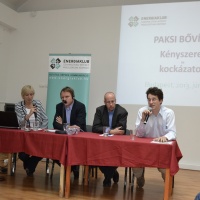Paks Nuclear Expansion: consumers will pay for it
„The new nuclear units, if ever built, will operate until 2075. Who can decide responsibly about such a commitment? Most of them will not even be alive at that time” – András Perger said in his exposition. According to the project manager of Energiaklub the expansion of the Paks nuclear power plant is an investment of several decades and its price will exceed 10 billion Euros. However, forecasting is difficult, as there is hardly any information available ont he planned expansion. „Apparently no one is interested in this 10 billion Euros, while there are intensive debates over millions in the Parliament.”

Summary of the event „Paks Nuclear Expansion - Constraints and Risks”
It is not transparent who and when will make a final decision about the expansion and, at the same time, the question of financing is not clarified at all: how will Hungary have the 10 billion Euros for this business?
In 2009 after a parliamentary resolution the preparation work of Paks 2 started. Since then Energiaklub has won several court cases on access to information regarding documents related to the expansion, and submitted complaints to the Constitutional Court as well as to the Parliamentary Commissioner for Future Generations, who agreed with the organization’s concerns. “Building a nuclear power plant is not a technical question. It cannot be put into the hands of engineers or politicians only, it should be a real public issue.” – said Perger.
At the event Martin Bursik, former Czech environmental minister and chairman of the Chamber of Renewable Sources of Energy emphasized the idiosyncrasies of the Central and Eastern European region: there is no public debate about nuclear energy in Hungary, just like in the Czech Republic, and the attitude towards nuclear in these post socialist countries is heavily determined by the decades of Russian influence. Bursik has spoken about current nuclear investments in Europe, emphasizing their economic and financial risks and unpredictability. He also brought up the issue of renewable energies, saying that the more renewable is included in the electricity generation, the smaller the specific production costs are.
András Deák, from the Hungarian Institute of International Affairs, a Russia expert, evaluated the potential consequences of the possible investment of the Russian nuclear company, Rosatom. Besides the many market and financial risks he stressed the importance of negotiation strategies. “It is a question, whether Hungary will be able to hold on facing the strong Russian position and whether the political decision makers can remain consistent in a situation where composing an attractive tender for applicants other than the Russians is a challenge in itself. It would be very embarrassing if no other investor was interested.” Deák emphasized that “the devil is in the details, Hungary can lose a lot on management (construction, licensing, consequences of delays, etc.), moreover, the Russians are much more experienced in positioning nuclear projects than Hungarians in implementing them.”
The event was organized in cooperation with Heinrich Böll Foundation.

12 June 2013




